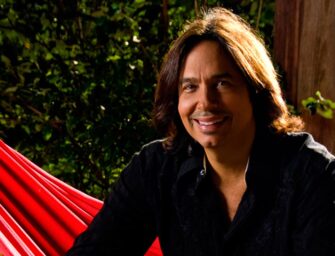Songwriting coach Eyvindur Karlsson explains how an extended version of the goal-setting framework can help you to set clearer objectives
In this article, I’m going to cover the basics of goal-setting, from a songwriter’s perspective, and introduce you to the SMARTER framework. It’s all well and good to have lofty dreams about where we want to go with our music career, but a dream without a goal is just a fantasy. If you put the dream in concrete terms, though, by setting a goal and giving it a deadline, it becomes a plan. That’s what we want for our careers: plans. I’ll use one of my dreams as an example. I dream of making a full-time living from song licensing so that I’m not dependent on touring or things like that.
If you’ve ever read anything about goal-setting, you’ve probably heard of the SMART framework. It’s a way to ensure that our goals work and we’re able to act on them. The SMARTER framework is a slight adjustment that I think works a lot better. SMARTER stands for Specific, Measurable, Actionable, Relevant, Time-based, Exciting, Risky.
I’m going to go through each of these factors in turn, and I encourage you to go through the process for yourself and set your own SMARTER goals…
Specific
Setting a goal that is specific enough is very important. In my example, the wrong way to phrase my goal would be: Make a living from song licensing. That’s a terrible goal! It needs to be way more specific than that. A better version of my goal would be:
Get enough songs into music libraries to make a full time living from licensing
That’s way more specific. It sets the bar high and it has a specific end in mind – making me a full time living through music licensing. That’s great. However, it’s still far from perfect. It needs a number! That’s where the next item comes in.
Measurable
In order to make the goal even more specific, and to make sure that it’s possible to keep track of success (or lack thereof), it needs to be easily measurable. Get enough songs into music libraries to make a full time living from licensing is not measurable. I need to add a specific number. Based on my research, you need 100-200 tracks to make a decent living through music libraries. So based on that, I’ll update my goal:
Get 200 tracks listed in music libraries
Actionable
A very important aspect of a proper goal is that it’s actionable. My goal of getting 200 tracks listed in music libraries is indeed actionable. The action steps are built-in: I need to find the right music libraries for my music and submit a total of 200 tracks to them.
There are more action steps involved, of course. I need to do research on which music libraries to work with, write more songs, record and mix those songs, create all the different versions the libraries require, and so on. These are of course very large steps, but that’s fine – I’ll break the goal down into bite-sized chunks later.

Goal-setting is like a map. It tells you where to go, and if you do it right it gives you a guideline for how to get there. Photo: Glenn Carstens-Peters
Relevant
When we set goals, it really pays to think carefully about their relevance. Is this goal the right thing for you to pursue at this stage in your life and career? For me, pursuing a goal of doing more touring would not be relevant. It would be a fun goal because I do love to travel and play live, but at my current stage in life, I don’t think it would be the best avenue to pursue.
Instead, writing and producing music in my home studio and earning a living from it through licensing fits in perfectly with my lifestyle and family arrangement. So that’s a relevant goal for me. If you’re in a place in your life where touring is the logical step on your journey, then that’s a goal for you.
Time-based
As I said, goal-setting is like a map. It tells you where to go, and if you do it right it gives you a guideline for how to get there. However, if you don’t have a clear timeline, it’s almost guaranteed to fail. If I just say, I’m going to get 200 tracks into music libraries and I don’t set a timeline, there’s no way I’ll get it done.
So, let’s set a deadline. As I said, I can probably gather 100 tracks to submit in fairly short order, and I’d need to double that amount. If I create one song per week, which is pretty easy for me, I’ll have 200 songs ready in about two years. Therefore, my time-keyed goal could be:
Get 200 songs listed in music libraries by March 1st 2024
Exciting
I think this part of goal-setting is often overlooked. Yes, goals need to be relevant and all of the other stuff, but if it doesn’t excite you, there’s no way you’ll be able to push yourself to do the work. So just make sure you’re truly excited about your goal.
Risky
I happen to be of the opinion that nothing is more detrimental to success than staying in one’s comfort zone. If a goal is safe, it’s not going to feel like a real accomplishment. And in fact, it’ll be a lot harder to get excited about. Therefore, I recommend setting goals that stretch the boundaries of what you think you’re capable of.
With that in mind, I am going to revise my goal yet again. Getting 200 songs ready for licensing in two years sounds very doable for me (I create music very fast, and that is in fact what I coach my clients to be able to do). It’s a pretty safe goal. So to make it riskier, I’m cutting it in half and only allowing myself one year. My goal then becomes:
Get 200 songs listed in music libraries by March 1st 2023
Now that is a risky goal.
What next?
If you’re really serious about your art, you need to be goal-oriented, and this is a great tool. In order to make it even easier for you, I want to give you a workbook to walk you through the process of setting your SMARTER goal, breaking it down into milestones and then scheduling your work so you’re set up for success. You can click this link to get the SMARTER Songwriting Goals Framework for free.
Good luck with your goals, and happy songwriting.



































Related Articles